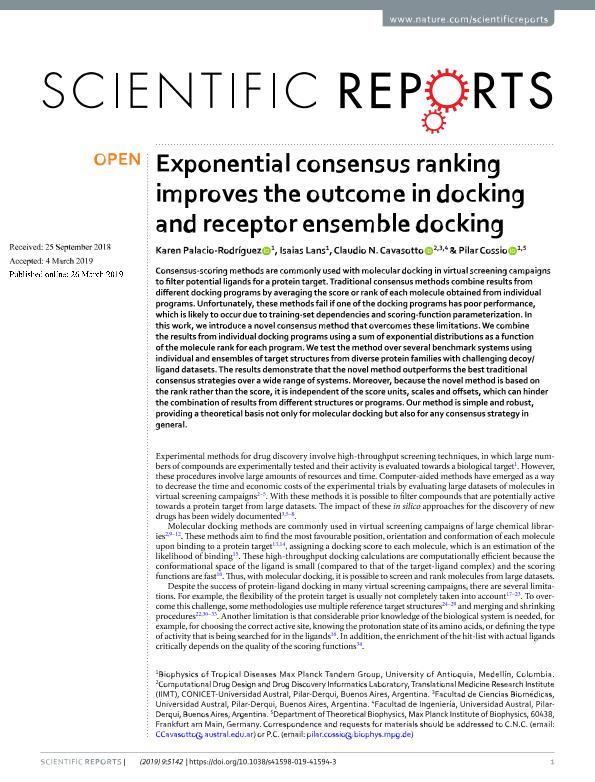Mostrar el registro sencillo del ítem
dc.contributor.author
Palacio Rodríguez, Karen
dc.contributor.author
Lans, Isaías
dc.contributor.author
Cavasotto, Claudio Norberto

dc.contributor.author
Cossio, Pilar
dc.date.available
2022-08-02T13:39:10Z
dc.date.issued
2019-03
dc.identifier.citation
Palacio Rodríguez, Karen; Lans, Isaías; Cavasotto, Claudio Norberto; Cossio, Pilar; Exponential consensus ranking improves the outcome in docking and receptor ensemble docking; Nature Publishing Group; Scientific Reports; 9; 1; 3-2019; 5142-5142
dc.identifier.issn
2045-2322
dc.identifier.uri
http://hdl.handle.net/11336/163874
dc.description.abstract
Consensus-scoring methods are commonly used with molecular docking in virtual screening campaigns to filter potential ligands for a protein target. Traditional consensus methods combine results from different docking programs by averaging the score or rank of each molecule obtained from individual programs. Unfortunately, these methods fail if one of the docking programs has poor performance, which is likely to occur due to training-set dependencies and scoring-function parameterization. In this work, we introduce a novel consensus method that overcomes these limitations. We combine the results from individual docking programs using a sum of exponential distributions as a function of the molecule rank for each program. We test the method over several benchmark systems using individual and ensembles of target structures from diverse protein families with challenging decoy/ligand datasets. The results demonstrate that the novel method outperforms the best traditional consensus strategies over a wide range of systems. Moreover, because the novel method is based on the rank rather than the score, it is independent of the score units, scales and offsets, which can hinder the combination of results from different structures or programs. Our method is simple and robust, providing a theoretical basis not only for molecular docking but also for any consensus strategy in general.
dc.format
application/pdf
dc.language.iso
eng
dc.publisher
Nature Publishing Group

dc.rights
info:eu-repo/semantics/openAccess
dc.rights.uri
https://creativecommons.org/licenses/by/2.5/ar/
dc.subject
DOCKING
dc.subject
ENRICHMENT FACTOR
dc.subject
CONSENSUS SCORING
dc.subject
ENSEMBLE DOCKING
dc.subject.classification
Otras Ciencias Químicas

dc.subject.classification
Ciencias Químicas

dc.subject.classification
CIENCIAS NATURALES Y EXACTAS

dc.title
Exponential consensus ranking improves the outcome in docking and receptor ensemble docking
dc.type
info:eu-repo/semantics/article
dc.type
info:ar-repo/semantics/artículo
dc.type
info:eu-repo/semantics/publishedVersion
dc.date.updated
2020-11-20T18:08:14Z
dc.journal.volume
9
dc.journal.number
1
dc.journal.pagination
5142-5142
dc.journal.pais
Reino Unido

dc.description.fil
Fil: Palacio Rodríguez, Karen. Universidad de Antioquia; Colombia
dc.description.fil
Fil: Lans, Isaías. Universidad de Antioquia; Colombia
dc.description.fil
Fil: Cavasotto, Claudio Norberto. Universidad Austral. Facultad de Ciencias Biomédicas. Instituto de Investigaciones en Medicina Traslacional. Consejo Nacional de Investigaciones Científicas y Técnicas. Oficina de Coordinación Administrativa Parque Centenario. Instituto de Investigaciones en Medicina Traslacional; Argentina
dc.description.fil
Fil: Cossio, Pilar. Universidad de Antioquia; Colombia
dc.journal.title
Scientific Reports
dc.relation.alternativeid
info:eu-repo/semantics/altIdentifier/url/https://www.nature.com/articles/s41598-019-41594-3
dc.relation.alternativeid
info:eu-repo/semantics/altIdentifier/doi/http://dx.doi.org/10.1038/s41598-019-41594-3
Archivos asociados
